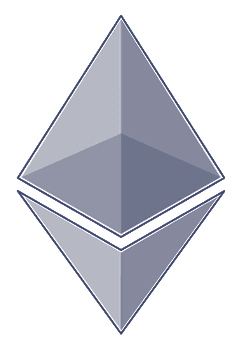Ethereum/en
Ethereum is a decentralised platform in which you can execute smart contracts. These are, applications who behave just as announced, and there is no possibility whatsoever to be manipulated, censored or pulled down by anyone. This is due to the programming language offered by Ethereum; Solidity wich is used to create the said contracts.
Ethereum was conceived in order to allow people to easily write decentralised apps (Đapps), using blockchain technology.
In order to execute the contracts, Ethereum uses ether, their own decentralised cryptocoin, that unlike other coins like Bitcoin, it reflects more than monetary value in transactions. It also feeds the smart contracts. It is used to infuse with value any operation done in several available services, like voting systems, crowdfunding platforms, or proving something happened at a certain point. In short, it is used a proof of work.
Purpose
The original purpose of the Ethereum Project was to build and spread an alternative to the World Wide Web, by making a decentralised and pseudo-anonymous: Static content publication (Swarm), Low Level pseudo-anonymous messaging system (Whisper), Trusted transactions (Ethereum) and Built-in User Interface (Mist).
Contracts
Smart Contracts are programs and protocols that make the automatic execution of a contract possible. The Ethereum contracts can be implemented in many languages, and in turn compiled in bytecode for the Ethereum Virtual Machine (EVM) before being distributed into the blockchain.
Each contract is executed in each node of the Ethereum Network at the same time, and the result is the consensual output. Doing any calculations in an EVM is really costly and you will "only be able to run things that would run on a 1999 mobile phone" (citation needed). Acceptable uses of the EVM include the execution of lógica de negocios ("if this then that"), signature verification, and cryptographic means: Non acceptable uses include using the EVM's as a database, email system, genetic programming or machine learning. These kind of contracts are a lot more prone to be used in Hyperledger, a ledger (database) distributed in nodes.
Development
At the end of 2013 the project began. The first concept trials (in Go and C++) were published in 2014. Since them, many PoCs have emerged, until on July the 30th 2015, Ethereum's own blockchain became public. Ethereum is an open source project and is hosted on GitHub
